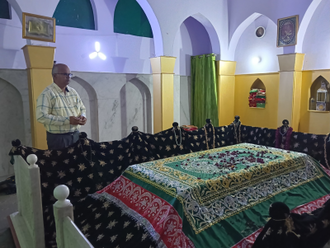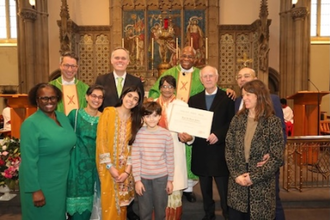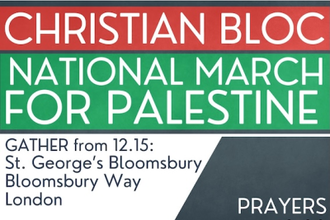India: Lessons from a Sufi Dargah

Joseph Victor Edwin SJ writes:
The Dargah of Bibi Fatima Sam, a revered woman Sufi saint, is tucked away in the residential neighbourhood of Kaka Nagar, providing a serene escape from the bustling city. It's conveniently situated just a kilometre from the Khan Market Metro Station. Bibi Fatima lived in the thirteenth century (1246-47 CE).
A marble slab beside her maqbara emphasizes her esteemed legacy, drawing a parallel between her and Rabiah al Basari, a renowned female Sufi saint from the 8th century.
The inscription reads: Mazar-e-mubarak, Rabiah dilli hazarat bibi fatima saam (The blessed grave of Rabiah of Delhi, Hazarat Bibi Fatima Sam). One inscription poetically reflects her holiness: "Her name shines brighter than the sun and the moon; the soil of her grave is more alive than you or I." These words highlight her standing as one of the greatest female worshippers (Ābidāt) of her era.
Sufi Hazrat Baba Farid Ganj Shakar took immense pride in referring to her as his "sister," admiring her greatness deeply. Hazrat Khwaja Nizamuddin Auliya frequently visited her Khanqah (spiritual hospice), seeking blessings (Fuyūz wa Barakāt) enveloped in its spiritually enriching environment. Both Baba Farid, along with Hazrat Nizamuddin Auliya, often sought solace in her hospice, drawn by her profound piety.
A poignant couplet attributed to Bibi Fatima Sam expresses her unwavering devotion to God, conveying that true Divine Love comes at the cost of worldly attachments. In Persian, it reads: "Ham ishq talab kuni ham jān khwāhī, Har dū talabī, walī muyassar na shawad," which translates to: "If you seek Divine Love and also desire worldly life, seeking both will not bear fruit." This sentiment resonates deeply within the Sufi tradition.
Louis Massignon noted that the Holy Spirit inspires the mystical calling of Muslim saints. Sufism, a special grace, is said to sprout through the lives of those who practice asceticism and engage in nocturnal prayers and fasting. These efforts reflect not merely human endeavours toward God but a response to divine inspiration. He underscored the responsibility of the Church to observe and learn from the seeds the Holy Spirit has sown in Islam. The extraordinary devotion and sanctity of exceptional individuals have consistently served as a means to purify Islam from within. Authentic Sufism represents the essence of true Islam-a meaningful, inward journey that emphasises the common good and seeks a personal relationship with God [Christian S. Krokus, The Theology of Louis Massignon: Islam, Christ, and the Church (Washington, DC: CUA Press, 2017), 184-85].
Just recently, Brother Muhammad Asad Khan and I undertook a pilgrimage to the Mazar of this esteemed woman saint. While there, we took some quiet time to pray. Brother Asad, seated next to me, recited a chapter from the Qur'an, while I found myself cultivating a deeper personal connection to Christ in a Muslim shrine. This attachment opened up a broader horizon for encounters with God that transcended the visible limits of the Church. The engraved words reminded me of Blessed Christian de Cherge's belief that a communion of Christian and Muslim saints already exists in God, now manifesting through our friendships, prayers, shared learning, hospitality, and mutual self-giving.
Fr Joseph Victor Edwin SJ, serves as a lecturer of Theology and Christian-Muslim Relations at the Vidyajyoti Institute of Religious Studies in Delhi, India.


















